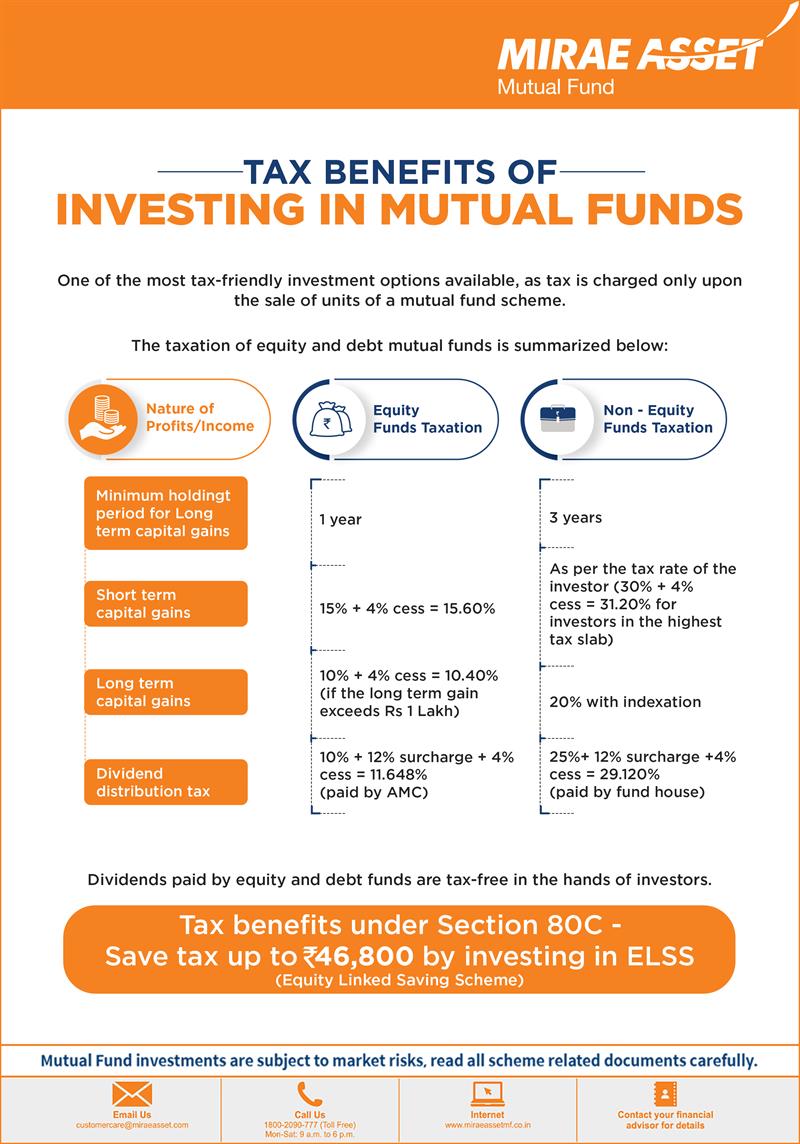Module 1 : Introduction to Mutual Funds
Taxation of Mutual Funds – Equity and Debt
Taxation of Mutual Funds – Equity and Debt
Investors often do not think about tax consequences when making investment decisions. For example, an investor can feel happy if he gets 8 – 9% interest from a fixed deposit scheme. However, if the interest income is fully taxable, and it usually is, then the effective post tax return for the investor in the highest tax bracket is 5.6 – 6.3% only. This return may not be sufficient to keep up with the inflation rate relating to the typical consumption basket of a middle income or upper middle income urban Indian investor.
Mutual funds, on the other hand, are one of the most tax friendly investment options available to Indian investors. An important point to note in mutual fund investments is that, an incident of tax arises only upon the sale of units of a mutual fund scheme.

Let us now discuss mutual fund tax benefits -
Tax on equity mutual funds (funds which have at least 65% equity allocation in their investment portfolios). The minimum holding period for long term capital gains in equity funds is one year. Short term capital gains (if the units are sold before one year) in equity funds are taxed at the rate of 15% plus 4% cess. Long term capital gains tax in equity funds is 10% + 4% cess provided the gain in a financial year is over Rs 1 Lakh. Long term capital gains upto Rs 1 Lakh is totally tax free.
Dividends paid by equity mutual funds are tax free in the hands of the investor but the AMC pays dividend distribution tax (DDT) at the rate of 11.648%.
Tax on debt mutual funds - The minimum holding period for short term capital gains in debt funds is 3 years. Short term capital gains (if the units are sold before three years) in debt mutual funds are taxed as per applicable tax rate of the investor. Therefore, if your tax rate is 30% then short term capital gains tax on debt fund is 30% + 4% cess. Long term capital gains of debt fund are taxed at 20% with indexation. To calculate capital gains with indexation, you should index your purchasing cost by multiplying the purchasing cost with the ratio of the cost of inflation index of the year of sale and cost of inflation index of the year of purchase, and then subtract the indexed purchasing cost from sales value. Indexation benefits reduce the tax obligation of debt fund investor considerably compared to investments in bank FDs and many small savings schemes.
While dividends are tax free in the hands of the investor, the fund house pays dividend distribution tax (DDT) at the rate of 29.120% for debt mutual funds before distributing dividends to investors.
The table below summarizes the taxation of equity and debt mutual funds
| Nature of Profits / Income | Equity Funds Taxation | Non-Equity Funds Taxation |
|---|---|---|
|
Minimum Holding period for Long term capital gains |
1 year |
3 years |
|
Short term capital gains |
15% + 4% cess = 15.60% |
As per the tax rate of the investor (30% + 4% cess = 31.20% for investors in the highest tax slab) |
|
Long term capital gains |
10% + 4% cess = 10.40% (if the long term gain exceeds Rs 1 Lakh) |
20% with indexation |
|
Dividend distribution tax |
10% + 12% surcharge + 4% cess = 11.648% |
25%+ 12% surcharge +4% cess = 29.120% |
Mutual fund tax benefits under Section 80C - Investments in Equity Linked Savings Schemes or ELSS mutual funds qualify for deduction from your taxable income under Section 80C of the Income Tax Act 1961. The maximum investment amount eligible for tax deduction under Section 80C, is Rs 1.5 lakhs. Investors in the highest tax bracket (30%) can therefore save up to Rs 46,350 in taxes (Rs 1.5 lakhs X 30.9% tax + cess) by investing in ELSS mutual funds. Investor should note that, Rs 1.5 lakhs is the overall 80C cap including all eligible items like, employee provident fund (EPF) contribution (deducted by your employer), PPF, life insurance premiums, NSC and ELSS mutual funds etc.